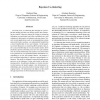Free Online Productivity Tools
i2Speak
i2Symbol
i2OCR
iTex2Img
iWeb2Print
iWeb2Shot
i2Type
iPdf2Split
iPdf2Merge
i2Bopomofo
i2Arabic
i2Style
i2Image
i2PDF
iLatex2Rtf
Sci2ools
124
click to vote
ICDM
2008
IEEE
2008
IEEE
Bayesian Co-clustering
In recent years, co-clustering has emerged as a powerful data mining tool that can analyze dyadic data connecting two entities. However, almost all existing co-clustering techniques are partitional, and allow individual rows and columns of a data matrix to belong to only one cluster. Several current applications, such as recommendation systems and market basket analysis, can substantially benefit from a mixed membership of rows and columns. In this paper, we present Bayesian co-clustering (BCC) models, that allow a mixed membership in row and column clusters. BCC maintains separate Dirichlet priors for rows and columns over the mixed membership and assumes each observation to be generated by an exponential family distribution corresponding to its row and column clusters. We propose a fast variational algorithm for inference and parameter estimation. The model is designed to naturally handle sparse matrices as the inference is done only based on the nonmissing entries. In addition to ...
| Added | 30 May 2010 |
| Updated | 30 May 2010 |
| Type | Conference |
| Year | 2008 |
| Where | ICDM |
| Authors | Hanhuai Shan, Arindam Banerjee |
Comments (0)

